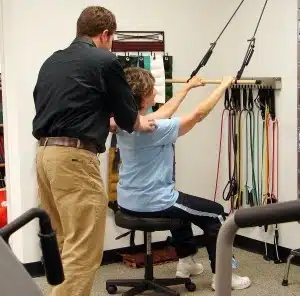You’ve been dealing with chronic pain for months, and have talked to your doctor about surgery. It’s been scheduled and now you’re anxious about getting through the day. But what do you do the day — or the week — after the operation?
Many patients focus so much on the hours spent at the hospital that they don’t consider the importance of rehabilitation after the operation. If your doctor has prescribed physical therapy after your surgery, it’s because he believes it will be a key part of your recuperation. Here are some of the reasons you may need to do PT after your operation.
Reason 1: To promote healing.
This is the most common reason doctors prescribe physical therapy after surgery, to make sure that your body heals properly from your operation. This could be to minimize scar tissue after arthroscopy on your knee or shoulder, or to retrain your muscles after a major surgery, like repairing an ACL tear. The variety of factors is a key reason to see a physical therapist, says Gabriel Enescu PT, Director of Rehabilitation at EXCEL Physical Therapy in Lodi. “Because the options and variables are so numerous,” he says, “it’s important to consult with your PT for a plan designed specifically for your situation.”
Keep in mind that your surgeon’s specialty is to diagnose and repair an injury, while physical therapists are musculoskeletal experts that are there to help improve the way you feel and function. A PT has the time for coaching and follow through that is key to healing, points out Gabriel.
Reason 2: To regain mobility.
Surgeries on the lower extremities in particular (think your knees and hips) require physical therapy to regain mobility. This could be getting back to daily activities like walking and gardening, or returning to more vigorous exercise, like running a race. Gabriel says, “PTs understand the different stages of healing, and they know how to progress the treatment program in a manner that will prevent injury or delay recovery time, so that the patient can return to his active lifestyle.” And don’t be concerned about what the person next to you is doing at the clinic. Gabriel notes that your physical therapist will take into consideration both your pre-op fitness state and your post-op goals when developing your treatment plan. In addition, Gabriel points out, a physical therapist will assess the joints and muscles above and the below the surgery site to make sure those areas are fully functional as well. “For example,” he says, “after a knee injury, the ankle can become less mobile, or the trunk muscles may become stiff and weak, which could cause the person to have to expend more energy while moving, causing them to become fatigued more quickly.”
Reason 3: To have a faster recovery.
Doing the necessary rehabilitation will help your body recover much more quickly than if left to its own devices. In the case of total joint replacements, it’s been shown that starting physical therapy as soon as in the recovery room (i.e., when you wake up from the anesthesia) can lead to shorter hospital stays and quicker recoveries.
Reason 4: To be involved in your rehabilitation.
Working with the physical therapist allows the patient to be actively engaged in his/her recovery, and research has shown that patients who are actively engaged in their healthcare have better experiences than those who are not. A patient can work directly with his PT to determine not only how to best recover from surgery, but also how to live a healthier life. “Time spent in therapy after surgery may vary dramatically,” says Gabriel, “but continuing on the path to health with recovery is very important. Completing your surgical solution with physical therapy is the most proactive way you can stay and keep healthy for years to come.” Many doctors will also send you for a few sessions of physical therapy before your operation. This will help to strengthen your body as much as possible. In addition, talking to your PT about what lies ahead, including length of rehabilitation and what levels of pain to expect during your recovery, can be a huge help when approaching your post-operation period. In fact, a recent study showed that back patients who had just one pre-op session with a physical therapist had a much smoother post-op experience. So take advantage of their experience to prepare for your own.
Being involved in your rehabilitation also allows you to recommend your surgeon the physical therapist that you want to work with after the surgery. Only you know who can take the best care of your post-surgery condition.
If you want to learn more about your possible surgery visit the Patient Education section of our internet site.



